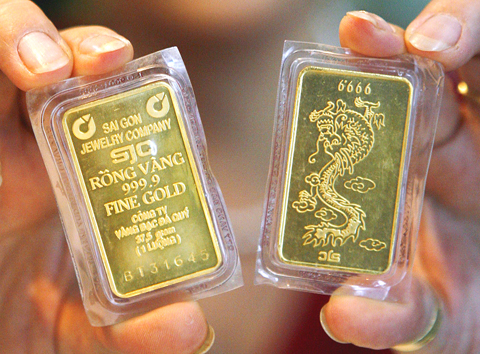Vietnam, where many people see gold as a safe haven against economic uncertainty, has ordered public gold-trading floors shut by March 31 because they rest on a “fragile foundation.”
The order affects about 20 gold-trading houses operated by banks and other firms, which have been running for more than two years, the state-run Vietnam News reported. Retailing of gold jewelry will still be allowed, it said.
The gold-trading floors have offered heavily leveraged trading in which investors pay a security deposit of only 7 percent of the net asset value of their trades while banks back the rest, the report said.

PHOTO: REUTERS
“It’s very risky for traders involved in such highly leveraged operations,” a Hanoi-based investment analyst, Bui Kien Thanh, told Dow Jones Newswires.
The government will need to reorganize the gold-trading floors as part of efforts to stabilize domestic financial and money markets, Thanh said.
A government statement said transactions at the gold-trading firms total up to thousands of billions of dong a day, but occur “on a fragile foundation that lacks legal, economic and technical frameworks and knowledge.”
In a report early last month the World Bank said Vietnam experienced a severe shortage of foreign exchange between May and July, and again in November.
“Uncertainty regarding the level of international reserves also encouraged a precautionary demand for gold and dollars,” putting significant depreciation pressures on the exchange rate, it said.
After burning through its official US dollar reserves, Vietnam in November devalued the dong in a bid to bolster trade, which has suffered during the global financial crisis. The World Bank has said Vietnam was the world’s biggest importer of gold in 2008, when the country’s inflation reached 23 percent for the year.
On Thursday the government reported a yearly trade deficit of US$12.2 billion, down 32.1 percent year-on-year but still too high, an analyst said.

Quanta Computer Inc (廣達) chairman Barry Lam (林百里) is expected to share his views about the artificial intelligence (AI) industry’s prospects during his speech at the company’s 37th anniversary ceremony, as AI servers have become a new growth engine for the equipment manufacturing service provider. Lam’s speech is much anticipated, as Quanta has risen as one of the world’s major AI server suppliers. The company reported a 30 percent year-on-year growth in consolidated revenue to NT$1.41 trillion (US$43.35 billion) last year, thanks to fast-growing demand for servers, especially those with AI capabilities. The company told investors in November last year that

Intel Corp has named Tasha Chuang (莊蓓瑜) to lead Intel Taiwan in a bid to reinforce relations between the company and its Taiwanese partners. The appointment of Chuang as general manager for Intel Taiwan takes effect on Thursday, the firm said in a statement yesterday. Chuang is to lead her team in Taiwan to pursue product development and sales growth in an effort to reinforce the company’s ties with its partners and clients, Intel said. Chuang was previously in charge of managing Intel’s ties with leading Taiwanese PC brand Asustek Computer Inc (華碩), which included helping Asustek strengthen its global businesses, the company

Taiwanese suppliers to Taiwan Semiconductor Manufacturing Co. (TSMC, 台積電) are expected to follow the contract chipmaker’s step to invest in the US, but their relocation may be seven to eight years away, Minister of Economic Affairs J.W. Kuo (郭智輝) said yesterday. When asked by opposition Chinese Nationalist Party (KMT) Legislator Niu Hsu-ting (牛煦庭) in the legislature about growing concerns that TSMC’s huge investments in the US will prompt its suppliers to follow suit, Kuo said based on the chipmaker’s current limited production volume, it is unlikely to lead its supply chain to go there for now. “Unless TSMC completes its planned six

TikTok abounds with viral videos accusing prestigious brands of secretly manufacturing luxury goods in China so they can be sold at cut prices. However, while these “revelations” are spurious, behind them lurks a well-oiled machine for selling counterfeit goods that is making the most of the confusion surrounding trade tariffs. Chinese content creators who portray themselves as workers or subcontractors in the luxury goods business claim that Beijing has lifted confidentiality clauses on local subcontractors as a way to respond to the huge hike in customs duties imposed on China by US President Donald Trump. They say this Chinese decision, of which Agence